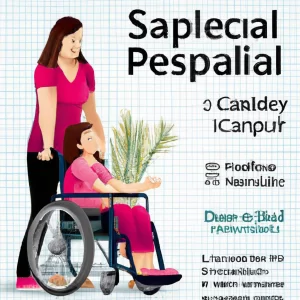Guardianship Nominations: Ensuring the Care and Well-being of Your Loved Ones
As one’s estate plan takes shape, the decision to appoint a guardian becomes a crucial consideration. A guardianship nomination serves as a vital component in protecting the interests and well-being of your loved ones in the face of unforeseen circumstances. As experienced practitioners in estate planning, the Morgan Legal Group is well-equipped to clarify the purpose of this pivotal element within the complex landscape of estate planning strategies. Join us as we explore the significance of a guardianship nomination and its profound impact on securing a legacy that transcends generations.
- The Importance of Designating a Guardian in Your Estate Plan
Designating a guardian in your estate plan is a critical step in ensuring the protection and care of your loved ones in the event of your incapacity or passing. By nominating a guardian, you have the power to specify who you trust to make important decisions regarding the upbringing and well-being of your minor children or dependents. This appointment provides peace of mind, knowing that your wishes will be honored and your loved ones will be in good hands.
Without a guardian nomination in place, the court will be responsible for appointing a guardian for your children or dependents. This process can be lengthy, costly, and may result in someone being appointed who you would not have chosen yourself. By proactively designating a guardian in your estate plan, you can avoid the uncertainty and potential conflicts that may arise from a court-appointed guardian. Let us help you ensure that your loved ones are well taken care of by including a guardian nomination in your estate plan.
- Ensuring the Care and Well-being of Minor Children
The purpose of a guardianship nomination in your estate plan is vital for ensuring the care and well-being of minor children in the event of your incapacity or passing. By naming a guardian for your children in your estate plan, you are taking proactive steps to protect their best interests and provide stability in the event that you are no longer able to care for them yourself. This nomination allows you to designate a trusted individual to make important decisions regarding your children’s upbringing, education, and healthcare.
Furthermore, including a guardianship nomination in your estate plan can help avoid potential conflicts or disputes among family members regarding who should care for your children. This nomination provides clear guidance and peace of mind to both your children and loved ones during a difficult and uncertain time. It is essential to work with an experienced estate planning attorney to create a comprehensive plan that addresses all aspects of guardianship and ensures the continued care and well-being of your minor children.
- Nominating a Trustworthy and Responsible Individual
Nominating a trustworthy and responsible individual in your estate plan is crucial to ensure that your wishes are carried out and your assets are properly managed after your passing. By appointing a guardian for your minor children, you can have peace of mind knowing that they will be cared for by someone you trust. This nomination also allows you to select a reliable individual to oversee the administration of your estate and make important financial and healthcare decisions on your behalf.
When choosing a guardian, it is important to consider someone who is reliable, responsible, and capable of fulfilling the duties required of them. Be sure to discuss your nomination with the potential guardian beforehand to ensure they are willing to take on the role and understand the responsibilities involved. It is also a good idea to select a backup guardian in case your first choice is unable to serve when the time comes. By carefully selecting a trustworthy individual to nominate in your estate plan, you can have confidence that your affairs will be handled according to your wishes.
- Factors to Consider When Choosing a Guardian
Factors
As we plan for the future, it’s important to consider what will happen to our assets and children in the event of our passing. That’s where estate planning comes in. Estate planning is defined as the process of arranging for the management and disposal of a person’s estate in the event of their death or incapacitation. It involves creating legal documents that outline your wishes and instructions for handling your finances, assets, and children after you’re gone. One important aspect of estate planning is the guardianship nomination.
So, what is a guardianship nomination and why is it an important part of your estate plan? In this article, we’ll break down the concept and explain its purpose and importance in the world of estate planning. We’ll also discuss the benefits of including a guardianship nomination and provide practical tips for executing this crucial document.
What is a Guardianship Nomination?
A guardianship nomination, also known as a Guardianship Designation, is a document that allows you to appoint a legal guardian for your minor children in case of your untimely death or incapacitation. This legal guardian will then have the responsibility of caring for and making decisions on behalf of your children until they reach the age of majority.
In your guardianship nomination, you can specify who you want to act as guardian and provide guidelines for how you want your children to be raised. This could include factors such as religious beliefs, education, and living arrangements. It’s also important to include alternate choices in case your first choice is unable or unwilling to take on the role of guardian.
Why is a Guardianship Nomination Important?
A guardianship nomination is crucial for a number of reasons. Let’s take a closer look at why this legal document is an essential part of your estate plan.
Protects Your Children:
One of the main reasons to include a guardianship nomination in your estate plan is to protect your children. Without a guardianship nomination, the court will be responsible for deciding who will care for your children in your absence. This can lead to a lengthy and stressful process for your loved ones and may not result in the desired outcome. By nominating a guardian, you can ensure that your children are placed in the care of someone you trust, and according to your wishes.
Avoids Conflict Among Family Members:
The absence of a guardianship nomination can also lead to conflicts among family members. In the absence of your specific instruction, family members may disagree on who they think should take on the role of guardian, causing unnecessary tensions and potential legal battles. By nominating a guardian, you can avoid these conflicts and alleviate stress for your family during an already difficult time.
Ensures Continuity and Stability:
A guardianship nomination also helps ensure that your children’s lives continue as smoothly as possible. By appointing a specific guardian, you provide your children with a stable and familiar environment, minimizing the disruption to their lives. This is especially important for young children who may need extra support and consistency during such a difficult time.
How Can I Include a Guardianship Nomination in My Estate Plan?
Incorporating a guardianship nomination into your estate plan is a relatively straightforward process, but there are a few things you should keep in mind.
First, it’s important to work with an experienced estate planning attorney to create a legally binding guardianship nomination that complies with your state’s laws. This ensures that your document will hold up in court and can be executed according to your wishes.
Next, think carefully about who you want to appoint as guardian for your children. This person should be someone you trust and who shares your values and beliefs. It’s also important to consider their ability to take on the role and the stability of their own personal life.
Practical Tips for Creating a Guardianship Nomination:
Here are a few practical tips to keep in mind as you create your guardianship nomination:
– Be specific: Provide clear and detailed instructions for your appointed guardian to follow in raising your children. This can include things like medical and educational preferences, religious beliefs, and general values that are important to you.
– Choose alternate guardians: In case your first choice is unable or unwilling to act as guardian, it’s important to have backups in place. These alternate guardians can also be helpful in the event of unforeseen circumstances.
– Review and update regularly: As life changes, so may your preferences for your children’s guardians. It’s important to review and update your guardianship nomination regularly to ensure it reflects your current wishes and circumstances.
In Conclusion:
Including a guardianship nomination in your estate plan is an important step towards protecting your children and ensuring their future is secure. By providing specific instructions for their care and appointing a trusted guardian, you can help alleviate stress and conflicts during a difficult time and ensure your children’s well-being. Be sure to work with a qualified estate planning attorney and review your document regularly to keep it up-to-date.












